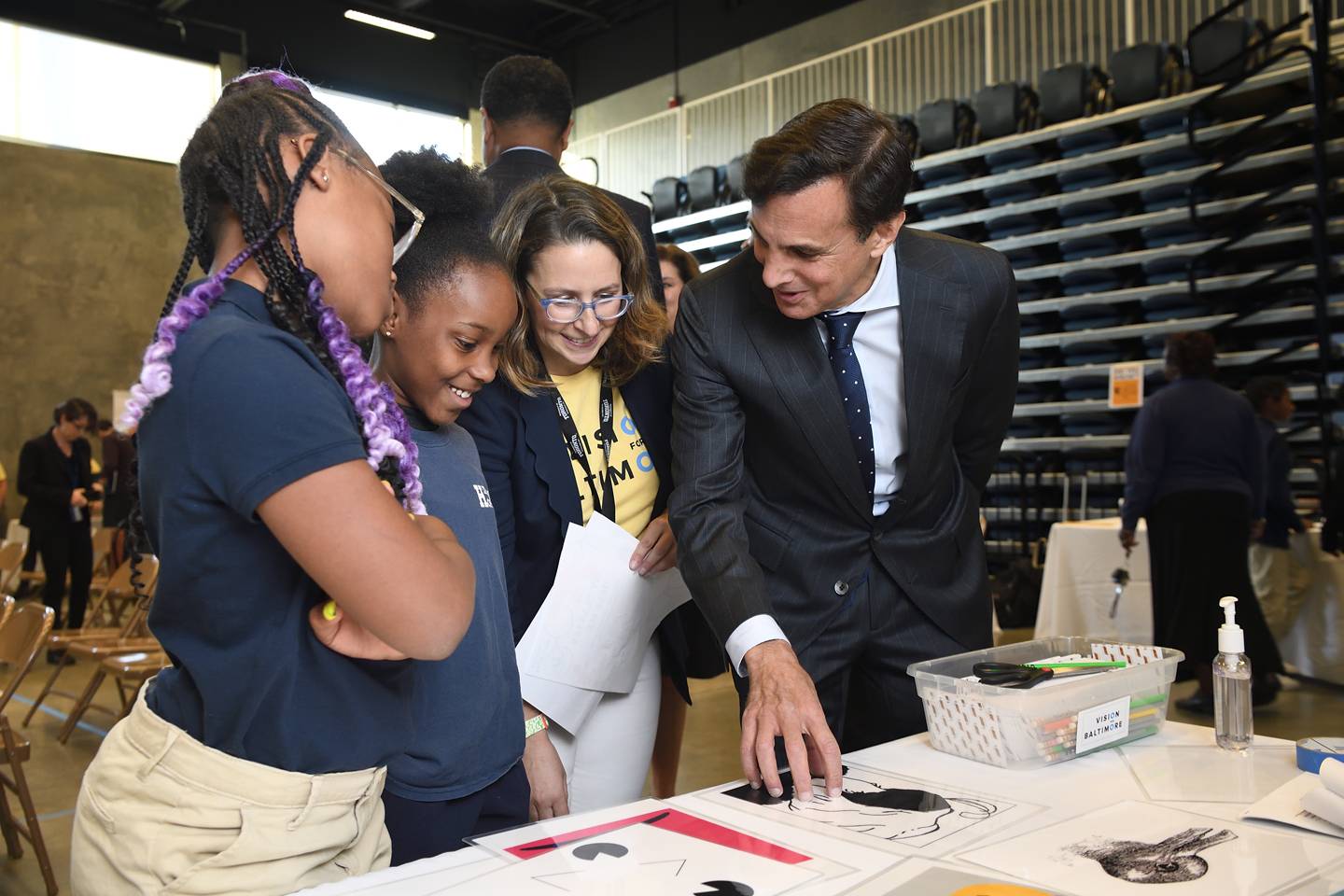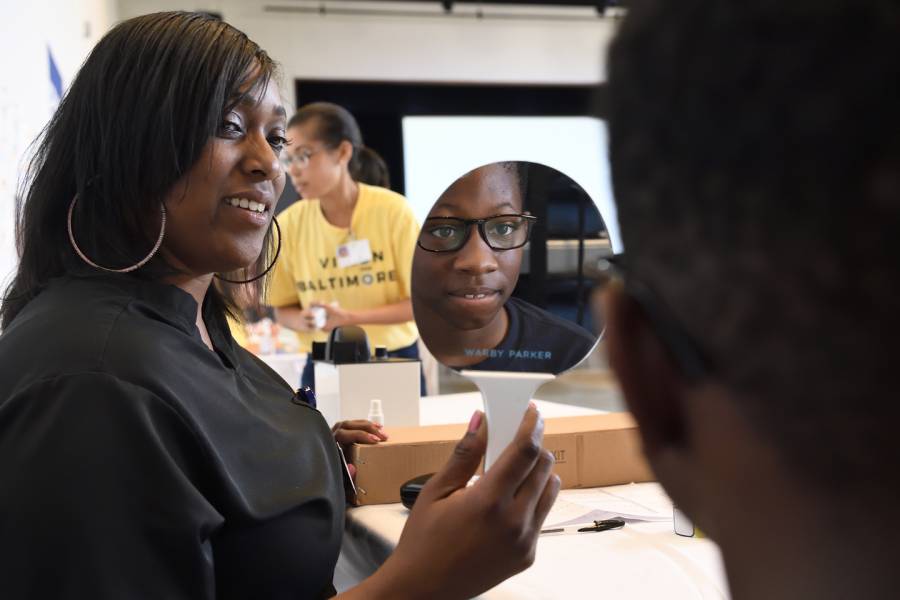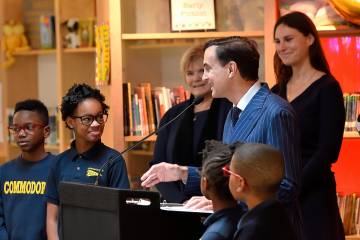Megan Collins got her first pair of glasses in first grade. They were brown and unflattering, and after a classmate teased her for wearing them, the glasses stayed behind at home each school day. She didn't begin to wear her glasses regularly until college—even though she needed them long before that.
So it means a great deal to Collins when children proudly and eagerly wear their glasses to school—and to know that she's played a prominent role in making sure they get the vision care they need. That's because Collins, an assistant professor of ophthalmology at the Johns Hopkins Wilmer Eye Institute, is helping to lead the citywide Vision for Baltimore program, which aims to provide all elementary and middle school students in Baltimore with vision screenings, eye exams, and eyeglasses, at no cost to their families.
Now in its fourth year, Vision for Baltimore has provided more than 50,000 vision screenings, nearly 9,000 eye exams, and more than 6,500 pairs of glasses to city students. It is operated and funded in partnership with the schools of Education and Medicine at Johns Hopkins University, Baltimore City Public Schools, the Baltimore City Health Department, eyewear retailer Warby Parker, and national nonprofit Vision To Learn.
"I am so proud of the partnership that we have across the city," Collins said during a vision health fair held today at the Henderson-Hopkins school in East Baltimore. "We have identified a problem for which we already know there is a simple solution—eyeglasses. Working together, we have been able to develop this innovative model bringing vision care directly to the kids in schools, as well as doing outreach and education through events like today."
Video credit: Len Turner and David Schmelick
The vision health fair, held in celebration of World Sight Day, was an opportunity for Johns Hopkins and its Vision for Baltimore partners to come together with students, parents, and university and city leaders for a day of exploration and learning. The fair featured interactive booths about eye anatomy, 3D vision, animal sight, and optical illusions.
"Vision for Baltimore is about more than what meets the eye," said Johns Hopkins University President Ronald J. Daniels, drawing a comparison between the Vision for Baltimore program and the optical illusion booth. "Yes, more than 9,000 have benefited from the program. Yes, kids succeed in schools when they can see. And yes, parents and students are learning more about eye care. ... But if you look closer, we're truly enhancing our sights, and not just those of our kids. We're enhancing the sights of our institutions to come together to solve problems. We are, in this program, setting our sights higher."
During his remarks, Baltimore City Mayor Bernard C. "Jack" Young asked the assembled Henderson-Hopkins students if they had received glasses from Vision for Baltimore. A group of students raised their hands. He then asked whether they had been screened, and nearly every hand shot up.
"That's good because when you see better you get better grades," he said. "We want to make sure you have all the tools you need to be successful in school because good grades are what get you to the next level."
Vision for Baltimore was launched in 2016 in an effort to counter the challenges of providing vision care to city students. In addition to providing $1 million in funding for the program, Johns Hopkins University has provided technical assistance, reaching out to schools and strategizing ways of building sustainable models for school-based vision care. Other funders for Vision for Baltimore include the Annie E. Casey Foundation, the Abell Foundation and the Hackerman family.
Also as part of the program, faculty from the Wilmer Eye Institute's Dana Center for Preventive Ophthalmology and the Johns Hopkins School of Education's Center for Research and Reform in Education are conducting a research study that examines the impact of such school-based eye care on academic performance and develops strategies to encourage students to wear their glasses in school.

Image credit: Will Kirk / Johns Hopkins University
Sonja Santelises, the CEO for Baltimore City Public Schools who also attended the event, said she regretted the time she herself spent as a young student having trouble seeing in class. Now, she likes to tell Baltimore schoolchildren that their glasses have special powers.
"This simple little thing called glasses, which I still wear, really opened up my world, and I realized that when you can see the board, you can pay attention to what teachers are saying," she said. "You can see the book that you're reading. It actually makes you want to read more. ... I'll let you in on a little secret—these glasses are actually magical, and they open up a whole new world."
She added that she was proud of the work Vision for Baltimore has accomplished in city schools.
"The fact that this initiative has taken something so simple and organized adults and the way we do work to help us make sure that young people in Baltimore can see, to me is proof of what happens when a community comes together around the needs of its young people," she said.
The Vision for Baltimore program has been a key partner for the Henderson-Hopkins school, which is operated by the Johns Hopkins University School of Education in partnership with Morgan State University. Since implementing the program during the 2017-18 school year, more than 40 Henderson-Hopkins students have received new Warby Parker glasses. Through ongoing monitoring and engagement, the Vision for Baltimore program helps ensure that students remember to wear their glasses and that glasses are replaced when they are broken. The ongoing partnership helps the school community and families come together around health and vision awareness.
"Henderson-Hopkins is a model school for the rest of the country, and what we've learned is that yes, we can support our kids academically, and we will, but to do that we have to wrap around and support the whole child—and the health and well-being of our students is really important," said Peter Kannam, the school's principal. "Having great vision care is so important—it allows them to participate, to engage, and to do better in school. So it is about how to prepare them for college and life, and part of that is taking care of their health needs. And Vision for Baltimore is a great partner for that."
Posted in University News
Tagged education, wilmer eye institute, ophthalmology, baltimore city, vision for baltimore









